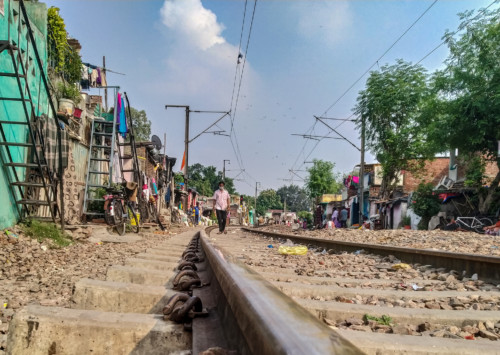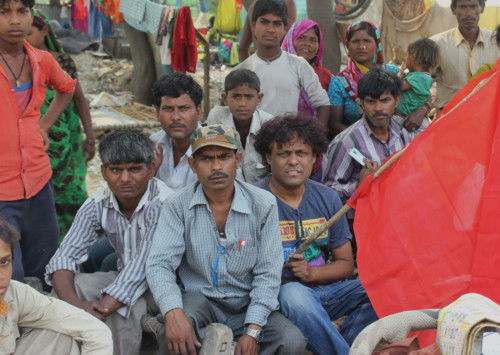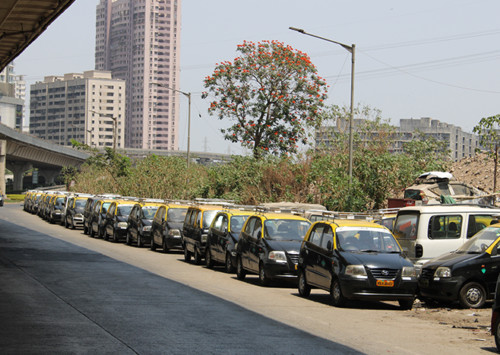Confusion, anger, panic in Delhi slums over Supreme Court order on demolition
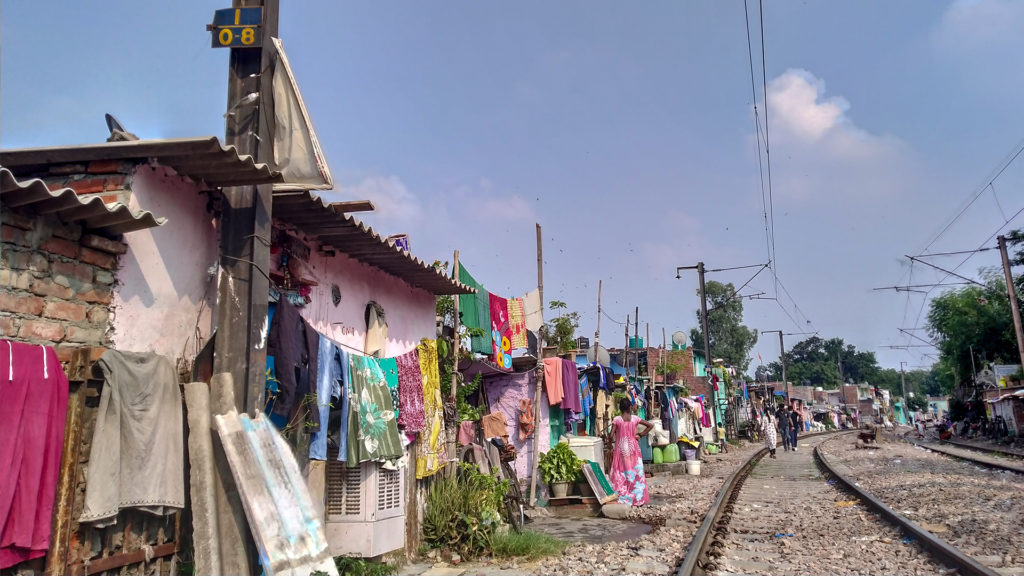
Residents of Jal Vihar slum colony in south Delhi say they will go launch indefinite hunger strike if their homes are demolished by the railways (MIG Photos/Aman Kanojiya)
Supreme Court’s order for demolition of slums on railway land in Delhi has created panic and confusion in the slums as residents say they will not vacate unless given alternative accommodation.
“I have been staying here for the past 50 years. Built a house, built a temple and made a life in this place. It breaks my heart to know that the Supreme Court has passed an order to demolish our houses,” says Raju Punjabi who is a priest in a temple that he built in Jal Vihar slum in south Delhi that abuts the railway tracks.
Raju says that he got the news about the Supreme Court’s decision only when media vans started gathering outside their colonies. Later someone forwarded him a WhatsApp message about the Court’s decision. “Till today, no one has come to inform us about this order and what its implications are for us. Neither is the MLA of our area saying anything. During elections we hear the government make big promises that they will build houses for us, but soon after the elections they not only break their promises but also are now breaking our homes,’’ Raju tells Media India Group.
Indeed, clarity is something that has been entirely missing in this story right from the beginning, from the time of the hearing of the case. The slum dwellers impacted by this decision, numbering well over 48,000, were not even aware that their fate was being decided in the Supreme Court. Ali Zia Kabir Choudhary, a Delhi-based housing rights lawyer, who has since the order filed an application seeking directions from the top court to the Railways to rehabilitate the people before eviction, says even he came to know of the case after the SC order was published in newspapers.
Not just that. Over a week after the order, slum dwellers in Jal Vihar have not received any formal information about whether their slum is up for demolition or not. The residents say that not one government official has spoken to them about the Supreme Court’s decision. However, there are a few who say that on Saturday, a few officials from the Railways visited their colony for some kind of survey.
“There were two-three officials who said they were from the railways and had come to do a survey. They asked few of our neighbours about the details of their Aadhar card and ration card, but when we asked them about the demolition of our homes they said they didn’t know anything about it,” says Puja, who stays near the Bara Pulia Jhuggi in Jal Vihar. Puja, who lives with her mother and her brother, has completed her graduation and is now looking for a job. “My mother came here in 1998 and since then she has been living here. I don’t have a job. How are we going to manage on our own? We need a place to stay. If they are taking it then they should provide for it,” she adds.
Indeed, rehabilitation is the crux of the matter. Most slum dwellers say they would move if given an alternative accommodation. But Choudhary says that the Railways is unlikely to do so unless they are ordered by the court. ‘‘We have seen this very often. Whenever government or a company wants a piece of land, they will go to the courts and say they need it urgently for a project of national or public importance. They would happily demolish the huts or homes built there without thinking of the consequences for the people who have made the piece of land their home for decades. But the moment the courts ask them to rehabilitate those living on their land, suddenly the entire urgency disappears and for years the land would not be used for any purpose,’’ Choudhary tells Media India Group.
To prove his point, Choudhary says a handful of slum dwellers, living in other parts of Delhi but who were also impacted by the SC ruling, received eviction notices from the railways on September 7 asking them to vacate before September 14, even though the SC has set a time limit of 90 days.
The shockwaves of SC’s order are bound to be felt across Delhi in the coming weeks as most residents are determined not to move unless they are given accommodation elsewhere. They say the timing of the order is especially critical as they are still in deep shock due to the five-month-long lockdown that has sent most of the slum dwellers deep into debt.
The priest, Raju, is worried about his children’s education. He says that their future is at stake now. “My children study in this area. I have had no work for so many months but since last month, we started getting back on our feet. And this threatens to disrupt everything, including the education of my children, who are my only hope. If I can’t provide better education to them then their life will be destroyed,” he adds.
Raju is not the only person facing this situation. There are many like Raju who seem lost and have no idea what is going to happen. Adi Lakshmi, whose family has been living in the colony for the past 70 years and works as a domestic help says that they should at least send us a notice. “I have five kids and we stay adjacent to the tracks. We have no idea what we will do if they take our houses. Where will we go? What are we going to do? The government should at least provide us with accommodation,” she adds.
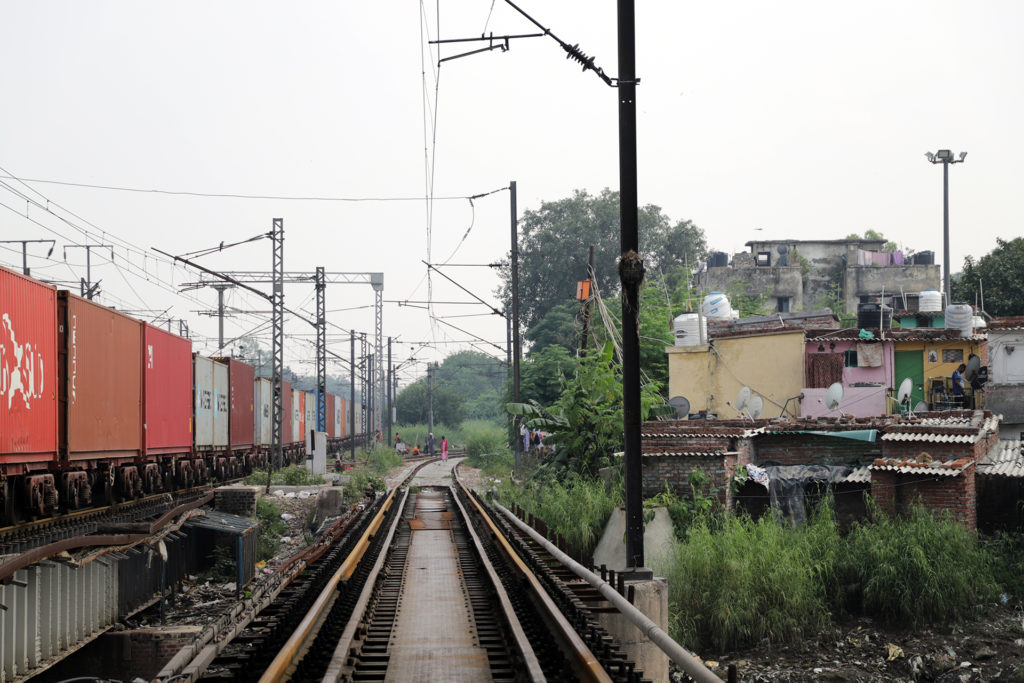
The residents say government has done precious little to help them, it could at least let them live in peace
R Mugam, who has a tea stall and lives in the colony since 1981 says, “Give us space to live then we will move. Otherwise we will go on a strike. This is my own house. My kid’s study here. How can they ask us to go from here without giving us an alternative place to stay?”
Raju shares the desperation and says that he will not give up without a fight and questions government’s various ID cards if even after that people have to prove that they are residents of a particular place. “What am I supposed to do with the ration card and Aadhar card when I cannot protect my house. If nothing works, I will go on a hunger strike,” says Raju.
Choudhary says he has filed an application for urgent hearing asking the top court to tell the Railways to rehabilitate the affected families before uprooting them. ‘‘If the government is serious about providing alternative accommodation, 90 days is more than enough. It means there would be no delay to the ‘important’ project that the railways needs the land for. They just need to have the will and desire to help the people,’’ says Choudhary.
Indeed, the Railways may have won the battle of the day in the top court, but the determination and desperation of the residents of Jal Vihar points that they have a long war of wills on their hands before they can uproot tens of thousands of families and add them to the long and rapidly growing list of homeless persons in Delhi.

